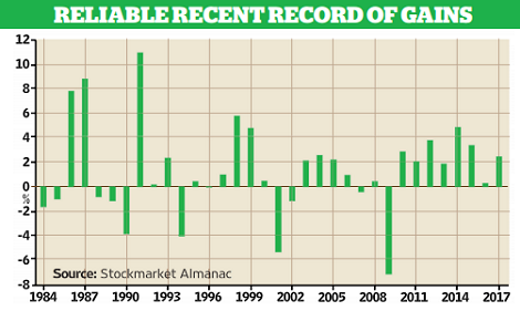Should you buy shares in February?
5th February 2018 09:27
by Stephen Eckett from ii contributor
Since 1970 the average monthly return from the FTSE All-Share index in February has been 1.6%, with the month seeing positive returns in 64% of years. But a glance at the chart below shows how strong the market has been in February in recent years.
Since 2009 the market has been up every February, and since 1994 it has seen significant negative returns in only three years.
There's no obvious reason for this consistent strength, although one possible explanation is that shares have been weak in January in recent years and tend to bounce back February.
In an average February shares tend to rise strongly on the first trading day and then trade flat for a couple of weeks, before gaining strongly in the middle of the month and finally drifting off slightly at the end of the month.
February is one of the best months, along with January, for mid-cap stocks relative to large caps. Since 2000, on average the FTSE 250 index has outperformed the FTSE 100 index in the month by 1.6 percentage points, during which time the large-cap index has outperformed midcaps in February in only four years.
On the international front, February is one of four months in the year when the FTSE 100 index has historically outperformed the S&P 500 index.
Since 1999 the UK index has underperformed the US index in February in only four years, although the outperformance is somewhat attenuated once currency is taken into account, as the pound is historically weak relative to the dollar in February.
Aside from shares, historically, this has also been a strong month for gold and silver.

This article was originally published in our sister magazine Money Observer, which ceased publication in August 2020.
These articles are provided for information purposes only. Occasionally, an opinion about whether to buy or sell a specific investment may be provided by third parties. The content is not intended to be a personal recommendation to buy or sell any financial instrument or product, or to adopt any investment strategy as it is not provided based on an assessment of your investing knowledge and experience, your financial situation or your investment objectives. The value of your investments, and the income derived from them, may go down as well as up. You may not get back all the money that you invest. The investments referred to in this article may not be suitable for all investors, and if in doubt, an investor should seek advice from a qualified investment adviser.
Full performance can be found on the company or index summary page on the interactive investor website. Simply click on the company's or index name highlighted in the article.
These articles are provided for information purposes only. Occasionally, an opinion about whether to buy or sell a specific investment may be provided by third parties. The content is not intended to be a personal recommendation to buy or sell any financial instrument or product, or to adopt any investment strategy as it is not provided based on an assessment of your investing knowledge and experience, your financial situation or your investment objectives. The value of your investments, and the income derived from them, may go down as well as up. You may not get back all the money that you invest. The investments referred to in this article may not be suitable for all investors, and if in doubt, an investor should seek advice from a qualified investment adviser.
Full performance can be found on the company or index summary page on the interactive investor website. Simply click on the company's or index name highlighted in the article.